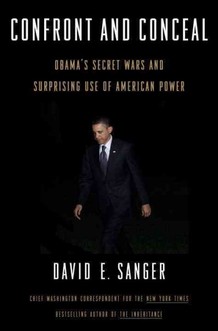FRESH AIR
Last week, The New York Times reported that Stuxnet, the computer worm that infected computers around the world in 2010, was developed by the United States in conjunction with  Israel to destroy Iran’s nuclear centrifuges. “It appears to be the first time the United States has repeatedly used cyberweapons to cripple another country’s infrastructure, achieving, with computer code, what until then could be accomplished only by bombing a country or sending in agents to plant explosives,” wrote David Sanger, the paper’s chief Washington correspondent. Sanger describes how President Obama decided to speed up clandestine cyberattacks against Iran’s nuclear facilities — and significantly expand America’s use of cyberweapons — in his new book, Confront and Conceal: Obama’s Secret Wars and Surprising Use of American Power, which details how Obama is using both innovative weapons and strategies to address rapidly growing threats around the world. On Monday’s Fresh Air, Sanger talks about the president’s changing foreign policy strategies in Yemen, Libya, Syria, Iraq, Pakistan and Afghanistan, where early idealism in the White House eventually transitioned into a policy called “Afghan Good Enough.” “Afghan Good Enough,” the nickname of a committee organized to narrow the goals in Afghanistan, met regularly with the president to determine what was considered “good enough” in terms of goals for the country. “The kind of conversations that took place within that group represented a realpolitik that no one ever admits to on Sunday morning talk shows,” writes Sanger. “One participant told me later, ‘We spent the time asking questions like, ‘How much corruption can we live with?’ ” MORE
Israel to destroy Iran’s nuclear centrifuges. “It appears to be the first time the United States has repeatedly used cyberweapons to cripple another country’s infrastructure, achieving, with computer code, what until then could be accomplished only by bombing a country or sending in agents to plant explosives,” wrote David Sanger, the paper’s chief Washington correspondent. Sanger describes how President Obama decided to speed up clandestine cyberattacks against Iran’s nuclear facilities — and significantly expand America’s use of cyberweapons — in his new book, Confront and Conceal: Obama’s Secret Wars and Surprising Use of American Power, which details how Obama is using both innovative weapons and strategies to address rapidly growing threats around the world. On Monday’s Fresh Air, Sanger talks about the president’s changing foreign policy strategies in Yemen, Libya, Syria, Iraq, Pakistan and Afghanistan, where early idealism in the White House eventually transitioned into a policy called “Afghan Good Enough.” “Afghan Good Enough,” the nickname of a committee organized to narrow the goals in Afghanistan, met regularly with the president to determine what was considered “good enough” in terms of goals for the country. “The kind of conversations that took place within that group represented a realpolitik that no one ever admits to on Sunday morning talk shows,” writes Sanger. “One participant told me later, ‘We spent the time asking questions like, ‘How much corruption can we live with?’ ” MORE
